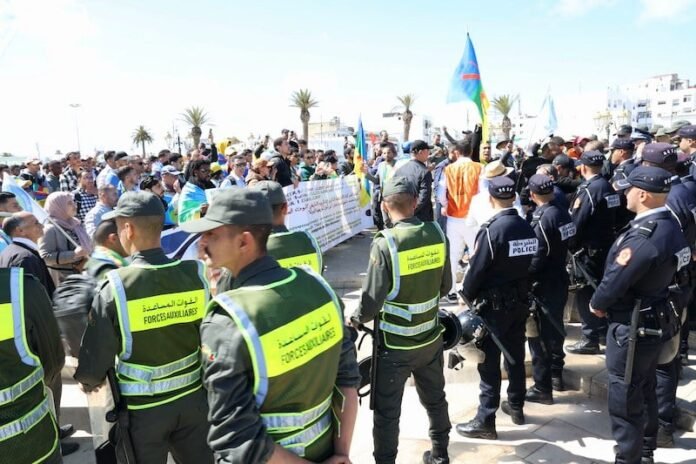The U.S. Department of State’s 2024 report indicates that Morocco’s human rights situation has not seen significant changes, noting that the government has taken “credible steps” to identify and punish officials responsible for violations.
Yet, the report highlights clear gaps between the legal framework and actual practice, raising essential questions about the effectiveness of reforms and commitment to citizens’ rights.
Judicial Transparency: Between Law and Practice
The report points out that investigations into police and security violations often lack transparency and face long delays and procedural obstacles that facilitate impunity.
A key question arises: are official measures sufficient to address violations if oversight mechanisms are weak or delayed? Is there a national plan to strengthen the independence of investigations and ensure victims’ rights?
Labor and Union Rights: Limits of Freedom
The report criticizes the denial of rights to unionize, strike, or engage in collective bargaining for employees in sectors such as the armed forces, police, and parts of the judiciary. Regarding professional and health standards, the report notes limited implementation due to a low number of labor inspectors (500 since 2002) and frequent legal challenges, alongside non-compliance with minimum wage standards.
This raises the question: how can monitoring mechanisms be improved to prevent labor rights violations, and what role can civil society and unions play?
Preventive Justice: Arrest and Detention
The report mentions continued pre-trial detention of suspects without formal charges, with some judges hesitant to grant temporary release or bail.
This raises a critical point: does Morocco need a fundamental reform of detention and investigation laws to protect individual rights and ensure fair justice?
Civil and Religious Rights in Times of Crisis
Amid Moroccan public solidarity with the Palestinian cause, the report notes concern among some Moroccan Jews over rising anti-Semitism following Hamas’s attack on Israel in October 2023.
A dual challenge emerges: how can Morocco balance freedom of expression and protest with the need to protect minorities from discrimination?
Migration and Asylum Policy: Positive Yet Limited Steps
The report commends Morocco’s facilitation of voluntary return for migrants in cooperation with the International Organization for Migration, as well as the reception of Sahrawis returning from Algeria, aligning migration procedures with the law.
Yet questions remain: are these policies sufficient to provide sustainable protection for refugees and asylum seekers, especially amid regional crises?
Broader Analysis: Between Official Data and Practical Challenges
Despite Morocco’s cooperation with the UN High Commissioner for Refugees (UNHCR) and humanitarian organizations, gaps persist between legal frameworks and practical implementation.
These include issues of torture and ill-treatment, harsh or inhumane penalties, arbitrary detention, restrictions on freedom of expression and media, and occasional targeting of journalists.
Questions for Reflection:
-
Are official steps sufficient to hold violators accountable if executive and oversight institutions remain under-resourced?
-
How can a balance be achieved between national security and individual rights, particularly in sensitive sectors like the armed forces and police?
-
What role can civil society and the media play in enhancing transparency and safeguarding human rights?
-
Is there a need to rethink detention and criminal justice legislation to prevent delays and misapplication?


